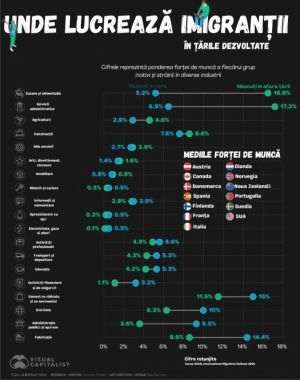The current turmoil in financial markets is not typical of a short-lived event in which one asset class or another collapses, but rather reflects a shift in narrative with far-reaching repercussions, according to CNBC.
The narrative in question is related to the Federal Reserve's policy of keeping interest rates low, which benefits everyone on Wall Street. However, this is changing, writes the American publication.
According to CNBC, there is a period ahead where interest rates will remain high for a longer period of time, an idea that Fed officials have tried to instill in the market, but which investors are only now beginning to absorb. Against this background, US stock market indices have been experiencing sharp declines over the past two months, and government bond yields have risen to their highest levels in sixteen years.
"When you have an economy based on zero interest rates, with this rapid movement [of the ten-year Treasury yield] towards 5%, the calculations have to change because the ramifications will change," said Quincy Krosby, chief global strategist. at LPL Financial. "The cost of capital is increasing, and companies will have to refinance at higher rates."
According to CNBC, the rate hike is all the more unpleasant as the third-quarter financial reporting season for US corporations is just around the corner. "All this has to be assimilated and digested by the market," added Krosby. "You can see it's disturbing and difficult."
• Concerns about the economy and inflation
According to the latest report from the US Labor Department, the number of new jobs created rose sharply in August, despite the perception that the labor market was weakening, putting less pressure on wage growth.
This has increased investor concerns that the US central bank will be forced to maintain its aggressive monetary policy. Incidentally, this perception was also maintained by at least four Fed members, who indicated that they either support higher rates or that interest rates will remain high for a long time, according to CNBC. "Much of the economy has been performing on the back of low and negative rates," Krosby said. "Now they are adjusting to what, from a historical point of view, would be considered a more normal rate regime."
According to CNBC, before the financial crisis of 2007-2008, the average 10-year yield on US Treasuries was around 7%, a level also skewed by the historic rate hikes of the early 1980s. "But after you live fifteen years in a regime with unnaturally low rates, what is normal seems abnormal," the American publication writes.
• Problems for banking institutions
According to CNBC, many parts of the United States economy face substantial risks from high interest rates, but no area is more exposed than banking. The sector was rocked earlier this year by the failure of several banks, which had accumulated too much long-maturity government debt, which it was forced to sell at a loss after facing a flood of demands to withdraw deposits.
In the second quarter, unrealized losses on banks' balance sheets totaled $558.4 billion, up 8.3% from the previous period, according to the Federal Deposit Insurance Corp. Of that, held-to-maturity securities, which have caused much of this year's turmoil, totaled $309.6 billion. But the expectation is that this amount will increase, believes Larry McDonald, a veteran of Wall Street and the founder of The Bear Traps Report, according to CNBC.
If yields on government securities rise to 6-7%, banks will have to cover their losses, so they may be forced to issue shares, which would dilute the price of securities of credit institutions, according to McDonald .
Higher interest rates are also felt by consumers, through higher mortgage or personal loan costs, among others. More than 36 percent of banks reported tightening lending standards in the third quarter, a level consistent with recessionary periods, according to CNBC.
At the same time, the dysfunction in Washington may add to the concerns of US bondholders, as US public debt has reached nearly 120% of GDP and net financing costs are rising rapidly. According to the Congressional Budget Office, next year the financing costs of the US debt will be 745 billion dollars, compared to 663 billion dollars this year, writes the American publication.
In addition, foreign investors have moved away from US government bonds, with China's holdings falling by about 17%, or $175 billion, over the past year, according to Treasury Department data. The Federal Reserve has also reduced its holdings of Treasuries by more than $800 billion since it stopped reinvesting the proceeds of maturing securities in June 2022, according to CNBC.
• Rates are approaching highs
For many market players, rates have approached highs. In addition, there is a perception that unless something changes quickly, a recession is almost inevitable, writes CNBC.
McDonald believes the Federal Reserve can't raise interest rates any longer. "It's just too much pain," the Wall Street veteran said.
In the opinion of Joseph LaVorgna, former White House economist, the appreciation of yields (n.e. US government securities) is probably close to the end. In his view, the possible consequences include an economic recession and the Fed having to start buying bonds again.
"The sell-off is not explained by fundamentals," said LaVorgna, who was the National Economic Council's chief economist under former President Donald Trump. "I think at some point the markets will get cheap enough to attract buyers. The fact that we are several standard deviations away from where rates should be suggests to me that we are closer to that point."
In his view, a weakening labor market or other signs of cracks in the economy may discourage the Federal Reserve from raising interest rates further and set the stage for lower rates. "The patient, i.e. the financial markets, is not very healthy. As I have said many times, the Fed has gone too far and too fast. Eventually, things will turn around," LaVorgna said, according to CNBC.
The S&P 500 was down 7.8% from its late-July high yesterday before the US open, but the main US stock basket was up 10% year-to-date, according to Investing.com data.





























































